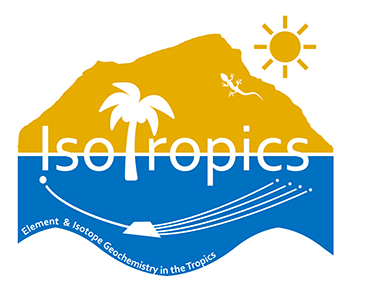IsoTropics Geochemistry Lab About Isotropics Geochemistry Lab
About Isotropics Geochemistry Lab
- Future Students
- JCU Global Experience
- International Students
- Open Day
- How to apply
- Pathways to university
- Virtual Open Day
- Living on Campus
- Courses
- Publications
- Scholarships
- Parents and Partners
- JCU Heroes Programs
- Aboriginal and Torres Strait Islander in Marine Science
- Elite Athletes
- Defence
- Current Students
- New students
- JCU Orientation
- LearnJCU
- Placements
- CEE
- Unicare Centre and Unicampus Kids
- Graduation
- Off-Campus Students
- JCU Job Ready
- Safety and Wellbeing
- JCU Prizes
- Professional Experience Placement
- Employability Edge
- Art of Academic Writing
- Art of Academic Editing
- Careers and Employability
- Student Equity and Wellbeing
- Career Ready Plan
- Careers at JCU
- Partners and Community
- JCU-CSIRO Partnership
- Alumni
- About JCU
- Reputation and Experience
- Chancellery
- Governance
- Celebrating 50 Years
- Academy
- Indigenous Engagement
- Education Division
- Graduate Research School
- Research and Teaching
- Research Division
- Research and Innovation Services
- CASE
- College of Business, Law and Governance
- College of Healthcare Sciences
- College of Medicine and Dentistry
- College of Science and Engineering
- CPHMVS
- Anthropological Laboratory for Tropical Audiovisual Research (ALTAR)
- Anton Breinl Research Centre
- Agriculture Technology and Adoption Centre (AgTAC)
- Advanced Analytical Centre
- AMHHEC
- Aquaculture Solutions
- AusAsian Mental Health Research Group
- ARCSTA
- Area 61
- Lions Marine Research Trust
- Australian Tropical Herbarium
- Australian Quantum & Classical Transport Physics Group
- Boating and Diving
- Clinical Psychedelic Research Lab
- Centre for Tropical Biosecurity
- Centre for Tropical Bioinformatics and Molecular Biology
- CITBA
- CMT
- Centre for Disaster Solutions
- CSTFA
- Cyclone Testing Station
- The Centre for Disaster Studies
- Daintree Rainforest Observatory
- Fletcherview
- JCU Eduquarium
- JCU Turtle Health Research
- Language and Culture Research Centre
- MARF
- Orpheus
- TESS
- JCU Ideas Lab
- TARL
- eResearch
- Indigenous Education and Research Centre
- Estate
- Work Health and Safety
- Staff
- Discover Nature at JCU
- Cyber Security Hub
- Association of Australian University Secretaries
- Services and Resources Division
- Environmental Research Complex [ERC]
- Foundation for Australian Literary Studies
- Gender Equity Action and Research
- Give to JCU
- Indigenous Legal Needs Project
- Inherent Requirements
- IsoTropics Geochemistry Lab
- IT Services
- JCU Webinars
- JCU Events
- JCU Motorsports
- JCU Sport
- Library
- Mabo Decision: 30 years on
- Marine Geophysics Laboratory
- Office of the Vice Chancellor and President
- Outstanding Alumni
- Pharmacy Full Scope
- Planning for your future
- Policy
- PAHL
- Queensland Research Centre for Peripheral Vascular Disease
- Rapid Assessment Unit
- RDIM
- Researcher Development Portal
- Roderick Centre for Australian Literature and Creative Writing
- Contextual Science for Tropical Coastal Ecosystems
- State of the Tropics
- Strategic Procurement
- Student profiles
- SWIRLnet
- TREAD
- TropEco for Staff and Students
- TQ Maths Hub
- TUDLab
- VAVS Home
- WHOCC for Vector-borne & NTDs
- Media
- Copyright and Terms of Use
- Australian Institute of Tropical Health & Medicine
- Pay review
In 2013, the College of Science and Engineering (CSE) at JCU built an AS 1386 Class 350 Clean Laboratory (ISO 14644-1 Class 7, or ISO 7 specifications) within JCU’s Advanced Analytical Centre (AAC), located on JCU’s Bebegu Yumba campus (Townsville). From its inception until 2019, the Clean Laboratory was built as a purpose-built space for whole rock digestion, and to conduct isotope chemistry (namely ion exchange chromatography) for Pb and Sr isotope analyses. In 2019, the Economic Geology Research Centre (EGRU) began a large-scale project involving stable metal isotope geochemistry (Cu and Zn isotopes at the world-class Mount Isa Cu-Zn-Pb deposit). This project sought the onboarding of stable metal isotope chemistry within the Clean Laboratory, thus generating the precursor changes leading to a transition from the Clean Laboratory with a focus on radiogenic isotope systems, to a high-capacity laboratory space for trace metal and isotope chemistry – the IsoTropics Geochemistry Lab.
In 2020, lab upgrades began towards the purpose of fully onboarding trace metal and isotope geochemistry, and moreover towards significantly enhancing the personnel capacity of the lab to accommodate present and future researchers, along with upscaled research ventures (industrial, commercial, medical applications). These upgrades saw the conversion of the lab space to a higher capacity facility capable of confined ISO 5 conditions (e.g. within chemical workstations) for isotope chemistry and elemental studies at the trace and ultra-trace level.
The research portfolio of the IsoTropics Lab spans a broad range of capabilities and applications. We currently have a number of trace metal and isotope geochemistry projects in progress: ore exploration, environmental source tracing, medical applications (e.g. disease diagnosis), as well as migratory/dietary characterisation of marine organisms and radiometric dating.
We can offer a number of research services for academia and industry/commercial applications which could include:
- collaborative or non-collaborative research
- radiogenic and novel stable isotope analyses
- hydrogeochemical analyses
- in situ sulfide analyses
- radiometric dating
For further details...
 |